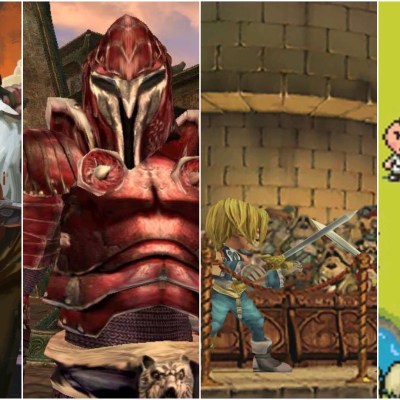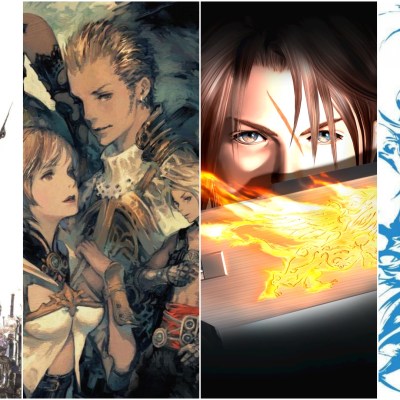When it comes to most video game franchises, it’s really not hard to know which game you should play first. There might be some debate about the best game in that particular franchise, but there’s usually something closer to a consensus regarding a reasonable jumping-off-point (especially in narrative-driven franchises). When it comes to the Final Fantasy franchise, though, that discussion has always been a little…different. Then again, the Final Fantasy franchise has always prided itself on being a bit different.
Anyone who has even cursory knowledge of video games has probably heard of Final Fantasy. It’s the series that cemented many JRPG ideas (and even saved SquareSoft from bankruptcy), but it’s also a franchise that regularly reinvents the wheel with every new entry in terms of its gameplay, story, setting, and characters. While that approach has resulted in an RPG franchise that is never afraid to be different, it has also resulted in some complicated questions about how outsiders should approach the series. Is it best to start with the first Final Fantasy game, the latest Final Fantasy game, the “best” Final Fantasy game, or the “easiest” Final Fantasy game? It can all get a little confusing.
While the debate will surely rage on regarding what the ideal first Final Fantasy experience is, those who want to finally try that fabled RPG franchise for themselves may be best off starting with one of the following incredible games.
Why You Should Play Final Fantasy IV First
There’s no way of sugarcoating it: The first few Final Fantasy games were rough. They weren’t bad by any means, but developer Square (now Square Enix) wasn’t yet used to creating grand JRPGs. It took the company four attempts to finally hit its stride.
Final Fantasy IV is the first entry in the franchise to solidify many signature aspects of the series. The narrative tells a gripping story full of memorable characters, betrayals, and surprise reveals that set the bar for the rest of the franchise. While the game lets players amass an ever-growing band of characters, it also often forces gamers to make do with what they have, since allies come and go as the story progresses. The story and characters are designed to keep players going and leave them eager to see what happens next.
Gameplay-wise, of the major selling points of Final Fantasy IV is its combat system. While previous entries were purely turn-based and simply allowed players to pick their moves each round, FF IV introduced the then-revolutionary “Active Time Battle” system (ATB). That mechanic forced players to pick character actions on the fly while enemies are still attacking, which encouraged quick thinking on top of planning ahead. Plus, Final Fantasy IV lets players control up to five characters at a time, which makes building a party less stressful than other Final Fantasy games.
While subsequent Final Fantasy games would expand on the ideas and mechanics introduced in Final Fantasy IV, the game still laid the groundwork for much of what makes the franchise so special.
Why You Should Play Final Fantasy VI First
Before Final Fantasy VII, the FF series made its home on Nintendo’s consoles. Final Fantasy VI was essentially the franchise’s final entry designed exclusively for Nintendo platforms, not counting re-releases, ports, or spin-offs. Essentially, Final Fantasy VI was the swan song for FF and Nintendo’s relationship, and it shows.
Final Fantasy VI features one of the best narratives in a franchise known for its incredible stories. At first, the story comes across as a somewhat generic “rebels fighting an evil empire” tale, albeit one brought to life by multifaceted and memorable characters. Soon, though, the game upends every expectation by prominently featuring a plot twist that sees the villain win. That sudden narrative heel turn (fueled by the franchise’s best antagonist) breathes new life into the game and sets up an incredible second-half adventure.
In many ways, Final Fantasy VI is a culmination of every prior Final Fantasy game. While Final Fantasy VI keeps the battle system from older titles largely intact, it also introduced ideas like a Desperation Attack mechanic that lets characters unleash super-powerful moves if their health drops to a dangerously low point. Plus, the game features plenty of side content for gamers who want a break from the main story, as well as some of the most iconic set pieces in Final Fantasy history. There’s a reason why many gamers fondly remember the opera scene and train battle. You know, the one where Sabin suplexes a haunted locomotive?
Final Fantasy VI is not only one of the best starting points for beginners; it is possibly the best entry in the franchise.
Read more
Why You Should Play Final Fantasy VII First
Final Fantasy VII is arguably the most popular entry in the franchise. The game has received several prequel spin-off titles, a sequel movie, and a divisive remake. That fame isn’t unjustified (the game is certainly one of the franchise’s better entries), but does this title’s popularity mean that FF VII is a beginner-friendly jumping-off point for newcomers? In many ways, it is.
While Final Fantasy VII’s graphics haven’t aged especially well, the story is like a fine wine and full of all the setpieces and plot twists audiences have come to expect from Final Fantasy. However, Final Fantasy VII also sets itself apart with themes you don’t normally see in the series or RPGs in general, such as pro-environmentalism, identity, and moving on from loss. While the game world is far more modern than most Final Fantasy entries, it is nothing if not unique.
Final Fantasy VII also excels on the gameplay side of things. That title’s combat is simple, satisfying, and features a downright perfected version of the Limit Break system, which lets characters unleash powerful one-use attacks. Moreover, instead of just learning skills naturally, character progression relies on special Materia that can easily be equipped. Swapping Materia around to produce different character builds might seem like unnecessary busywork (because it kind of is), but it is also intuitive and provides more character customization than most other Final Fantasy games. Plus, anyone who gets bored of the main story can take a break in one of Final Fantasy VII’s countless side activities. If you ever wanted to go snowboarding or bet on “horse” races in a Final Fantasy game, this one’s for you.
In all honesty, Final Fantasy VII made the franchise mainstream, so why not start with the title that shoved the series into the limelight?
Why You Should Play Final Fantasy IX First
Even though Final Fantasy VII and VIII are excellent titles in their own right, they were infamous for dropping the “fantasy” part of “Final Fantasy.” Sure, the games feature magical creatures and spells, but their worlds are more rooted in science fiction and technology. So for the final Final Fantasy game on the OG PlayStation, SquareSoft decided to create a title that channeled the fantasy elements and tropes from earlier titles but also utilized the quality of life and technological improvements of recent entries. The result blew audiences away.
In many ways, Final Fantasy IX is a retro throwback to older entries. Mechanically, the game is rather uncomplicated compared to the previous two PS1 entries in the series. Amass enough victories while wearing certain equipment, and your Final Fantasy IX characters can permanently learn important skills. Moreover, Final Fantasy IX simplified the already approachable Limit Break system through the expanded use of Trances. Instead of providing one-off skills, Trances automatically strengthen characters and let them use unique abilities. While Trances can’t be saved for tough boss battles, they can give characters a second wind since those Trance transformations also remove status ailments.
Even though Final Fantasy IX throws players into a slightly more familiar medieval setting, the game excels at worldbuilding and is filled with throwbacks to old Final Fantasy tropes. For instance, Vivi’s design is cut from the same cloth as Black Mages from the original Final Fantasy, and the game’s battle theme features the same opening notes as earlier entries. Moreover, even though the game delves into mature and even dark themes, Final Fantasy IX expertly balances them out with funny dialogue and memorable character personalities.
In many ways, Final Fantasy IX is the perfect blend of new and old. The game mixes the fantasy aesthetics from earlier entries that fans fell in love with modern storytelling and systems. It’s a great way to experience the appeal of classic FF games if you don’t want to go quite that far back into the franchise’s history.
Why You Should Play Final Fantasy X First
When Square announced Final Fantasy would make the leap to PlayStation 2, it was up to the franchise’s developers to leverage that console’s power and help usher in a new era for the series as well as JRPGs. Not only did they do that, but they managed to create one of the most approachable Final Fantasy games in the process.
Final Fantasy X is one of the simplest entries in the franchise, or, to put it a bit more bluntly, the most linear entry. Unlike Final Fantasy XIII, though, which was derided for its linear nature, Final Fantasy X is the good kind of linear. Maps are small and straightforward, so it’s difficult to get lost. Players are even encouraged to revisit old areas thanks to a multitude of sidequests. Moreover, Final Fantasy X’s combat is a mix of true turn-based and ATB. Each character has to wait their turn, but players have as much time as they need to pick the right move and are able to see exactly how the turn order will play out ahead of time. Gamers can even swap out allies in the middle of combat. Those features help ease players into the challenge, as even though the barrier of entry is low, the skill ceiling can stretch pretty high. Actually, Final Fantasy X‘s Sphere Grid system is still considered to be one of the franchise’s best character-building systems, and some of the game’s later challenges are appropriately difficult.
Storywise, Final Fantasy X is a spectacle. The game’s central narrative is somewhat straightforward compared to more complex JRPGs, but is epic and filled with plot twists and memorable cutscenes. The game’s music also sets the tone better than most Final Fantasy entries. Moreover, Final Fantasy X is the first Final Fantasy game to feature a significant amount of voice acting. Sure, modern Final Fantasy games (and video games in general) take voice acting for granted, but at the time, it was a revolutionary addition. Final Fantasy titles were known for being dialogue-heavy, so Final Fantasy X’s voice acting helps keep audiences interested even when faced with what would otherwise be a wall of expository text.
Final Fantasy X might not be the strongest entry in the series, but it uses advances in technology and game design to craft a JRPG that is welcoming to newcomers without boring genre veterans.

